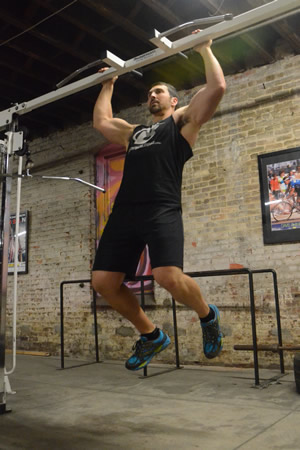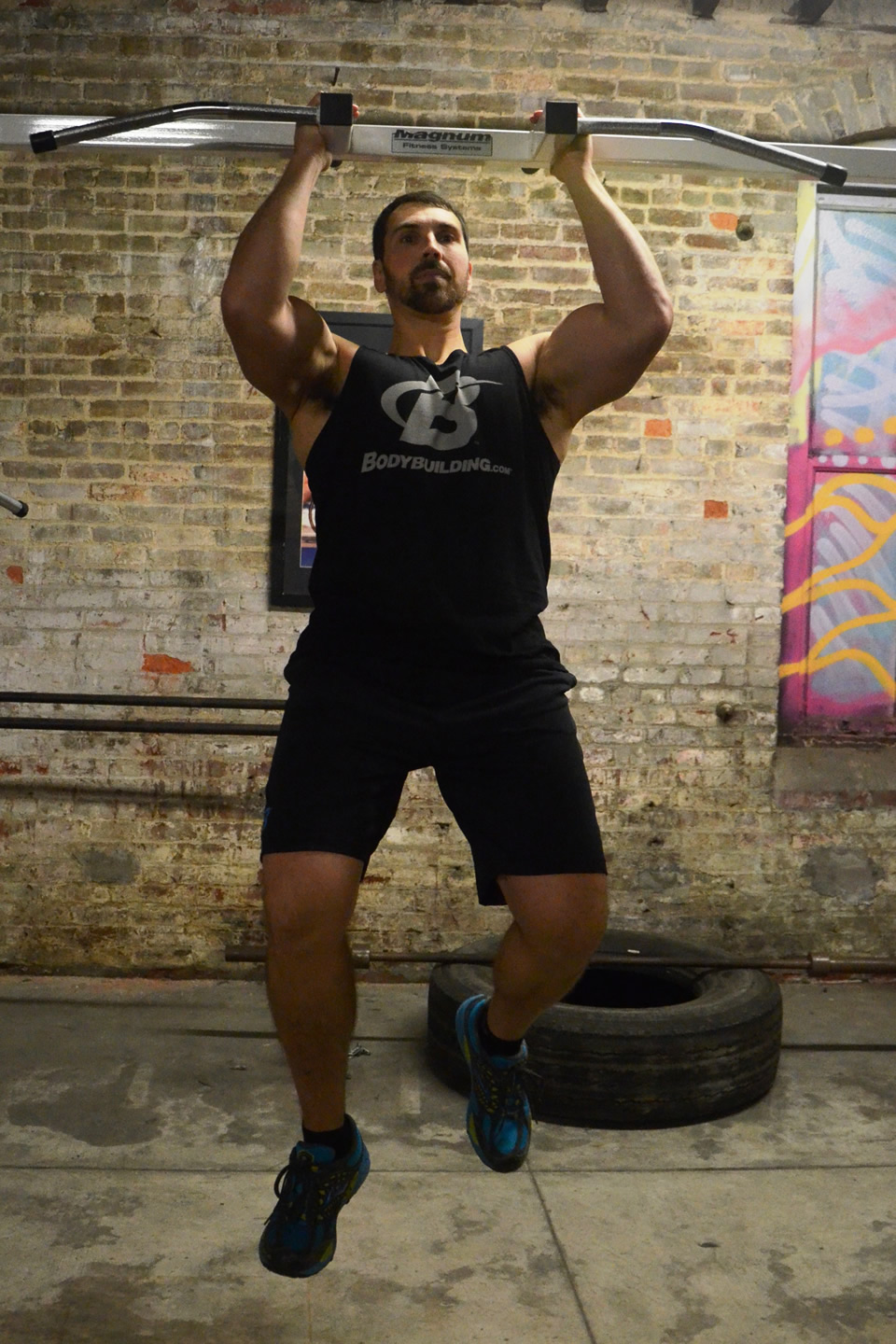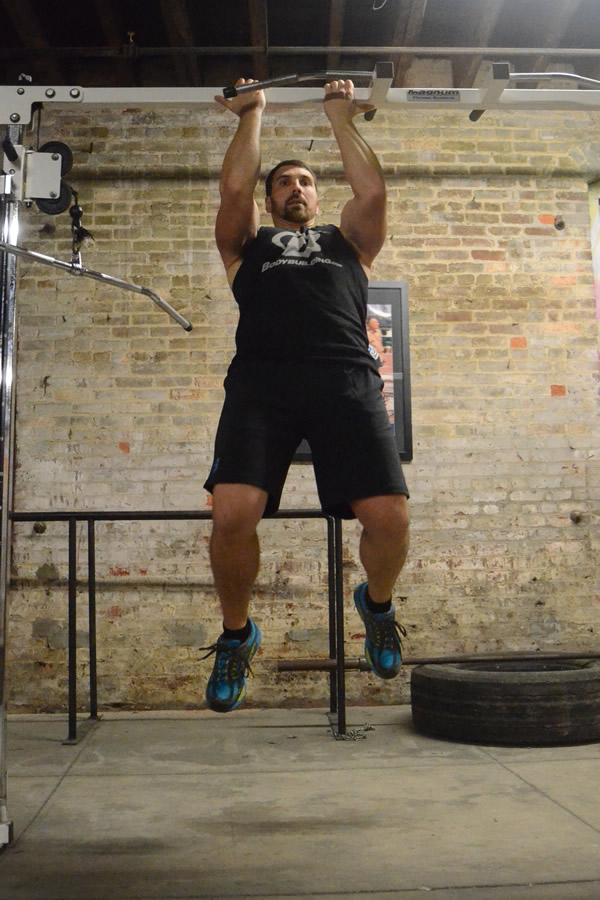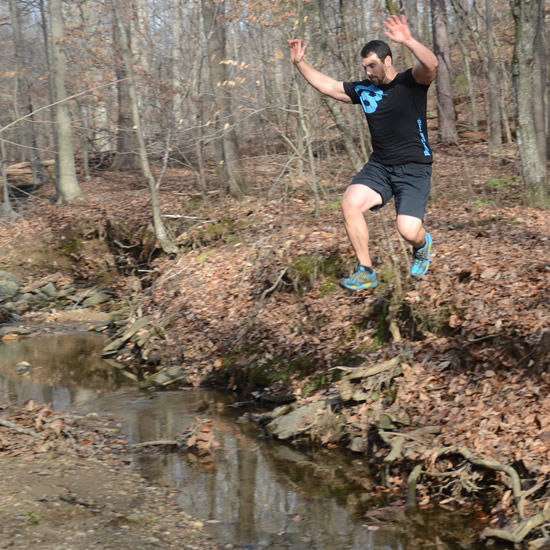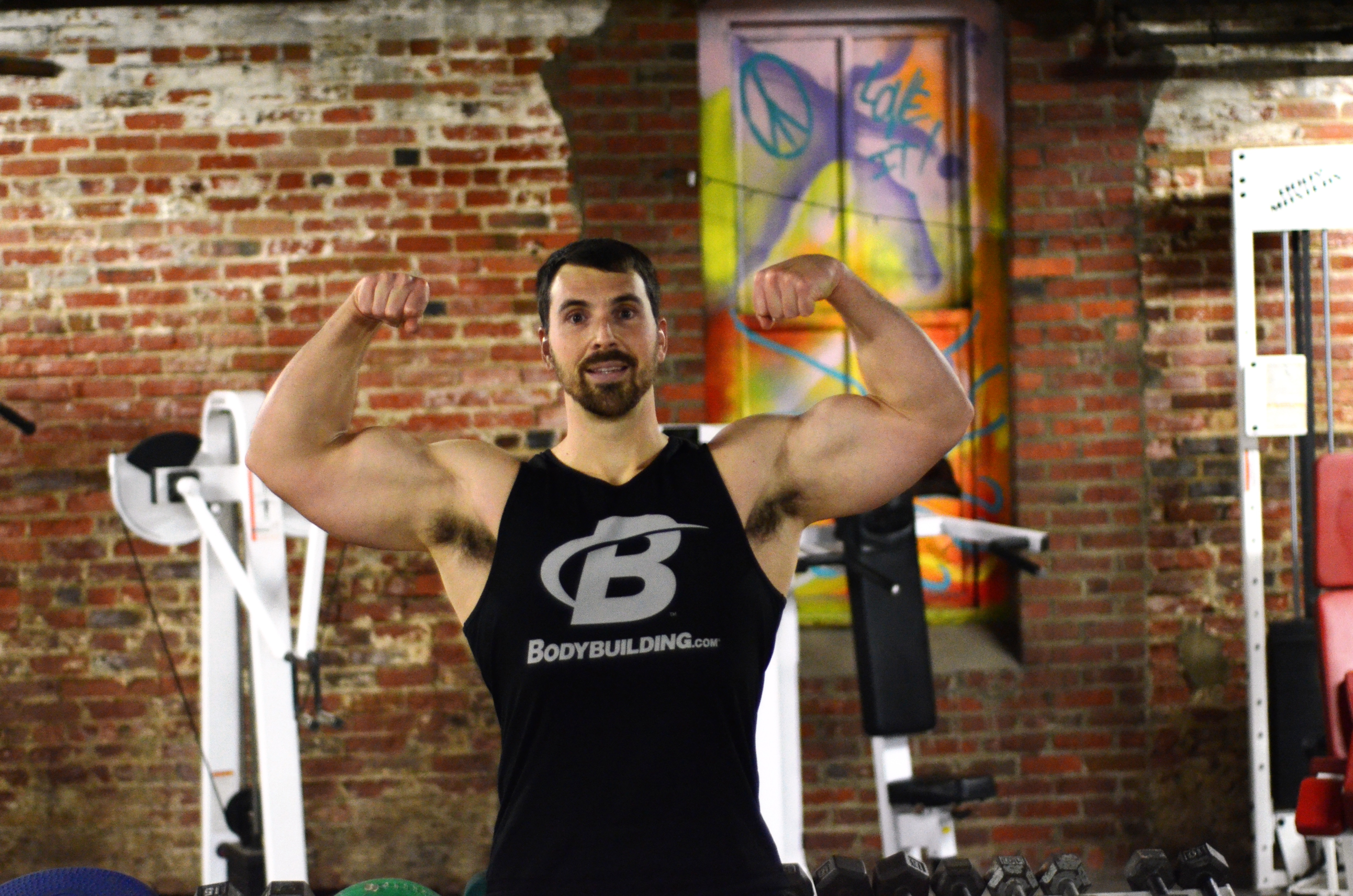Hand Strengthening with Pullups
- Details
- Written by Dave Gluhareff
Hand Stengthening doing Pullup variations!
I love doing pullups and lots of them! I also love to perform various pullup variations each week to hit my lats, posterior delts (rear shoulders), serratus anterior (rib meat), arms, and core! One of the best things about pullups though is working hand strength too!
Notice in these pics I usually choose a wide bar or even wide frame to do mine on. When I am in the woods I find bigger and thicker limbs to grab onto and do my pullups too. I never use gloves, haven't in prob 18 years working out, so that helps my hands to stay rough and calloused yet I do use Gold Bond medicated lotion once to twice daily to keep them smooth but my hands stay alot tougher and i dont get blisters at all. I believe, and it's my personal opinion, that people who get blisters after a few pullups or even one workout of intense pullups, and they show bleeding hands, well that means there hands weren't ready for that and they are not conditioned. Again that's my personal opinion because my clients and readers who practice these without gloves and build up gradually taking care of their hands rarely get a blister.
In OCR I do not like to compete with gloves on because I lose gripping ability and hands get slippery with gloves so I train with bare hands like I compete. I've never gotten a penalty climbing or doing monkey bars etc in almost 4 years. I train my hands to be as ready to take on any obstacle as can be.
Important: my pullups variations may happen once to twice weekly and they are planned into my weekly workout plans and monthly training goals so I still get a few days off to rest and recover and heal. I may do 60-100 pullups in varying grips and it may only be a 1/4 of that upper body workout.
Later I will show you how I work on my grip and forearm strengthening exercises.
Remember to check us out at www.facebook.com/strengthrunner !!
Keep Your Body Strong and Run!
- Dave
Strength Runner - A New Breed of Athlete
- Details
- Written by Administrator
Strength Runner– A new breed of athlete
By Professional Trainer, Writer, and VPX Sponsored Athlete –
Dave Gluhareff of www.StrengthRunner.com& www.TrainWithDave.com
I want to write about being a strength runner. I do not see myself solely as a strength training athlete nor do I see myself as an endurance running athlete only. I see myself combined as a strength and endurance runner which I like to call a Strength Runner. I love how the body moves and I love to perform feats of strength but I'm also in love with running long-distances.
As I write this I am considered one of the largest ultra obstacle course racing (OCR) and ultra running athletes in the world because of my height of 6'2" tall and weight of 232 pounds. I cannot choose just strength or just running so I have combined the two forms of training and use them in my competitions and everyday life.
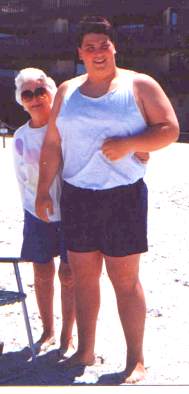
In the late 1990s I weighed over 300 pounds and was severely obese. I lost over hundred pounds with various cardiovascular activities, including running, and strict dieting. After I lost the hundred pounds I was introduced to strength training by friend and she changed my life forever. I found that I became stronger, was able to eat more, developed an athletic physique, and overall improved my quality of life with strength training. I didn't begin bodybuilding for competition on stage, no only competing with myself and advancing my own physique. Bodybuilding has been a huge part of my strength training programming from the beginning. I also became a certified personal trainer with the International Sports Sciences Association and began my career in fitness in the late 1990s. Strength training in the form of weightlifting, bodybuilding, plyometrics, balance training, flexibility training, calisthenics, Olympic lifting, cross strength training, powerlifting, strongman training, and various other techniques and approaches intensely changed my life for the better. Variety is key.
I also owe an enormous amount of gratitude to endurance training and running long-distances. As I began to lose my weight years ago I went from walking to power walking to light jogging and found that my body absolutely was falling in love with running. Years ago as a young athlete, yet obese, I always loved to run I usually ran short distances and sprinted a whole lot. When I was down about 30 or 40 pounds of my hundred pound loss I began to run faster and longer distances and at a weight of about 260 pounds. I had a Forest Gump moment then and I was able to run one night almost 8 miles nonstop Lol! That run was in the back country roads, up and down big hills, near where our farmhouse was and I was in a zone and all to myself. That particular run stood out to me and it felt like I was in another dimension. I felt as though I was a village person in Africa running from village to village and this was my new mode of transportation. Learning to run long distances was my own personal renaissance era and new cardiovascular training. I’ve never had the build or look of a runner, but I’ve always loved running! I would run three times weekly a short medium and long run with a day off or two days off in between for rest and recovery. As soon as I was introduced to strength training after I lost the hundred pounds I then combined my two favorites of strength training and endurance running.
I have always thought of myself as a strength runner. And I believe that even in my size of 6'2" and 232 pounds is possible to keep this up the rest of my life. I am already 36 years old and for years and years I've kept the same running regimen of three runs weekly with a short distance, medium distance, and long-distance run. Generally on a few of my on and off days from running are my 3 to 5 strength training days. Weekly I combined strength training and endurance running with an appropriate amount of rest and recovery days. I wholeheartedly believe that this is acceptable and healthy training for my body type and anyone's body type who wants to combine strength training and endurance running.
I am a sponsored athlete (VPX Sports/Redline for Supplements, Danville Regional Medical Center in Virginia for Travel, and Bondi Band for OCR racing Head Bands) that regularly races in the sport of elite obstacle racing and survival running. I also trained myself and compete in ultra marathon running distances and have done so for years in my own training. I believe our body’s ability to adapt and overcome is magnificent. Our muscles, joints, ligaments, tendons, and bones have an exceptional ability to adapt, overcome, and strengthen to prepare for their next challenge of strength or endurance running. This type of training is only possible with the appropriate amount of rest and recovery days suitable to allow for the healing processes of the body to work adequately.
To be a strength runner one has to have a passion for both the arts of strength training and of endurance running. Some people just want to do strength training and then take walks, sit on a stationary bike, or ride an elliptical machine… and if that's what you desire then so be it. Most of us however want to move our bodies by running short, medium, and long distances. Many people say if you want to run long distances then you should not strength training heavily. Many lifters believe when you run long-distances you will sacrifice muscle and become small and be flabby. Those same lifters say if you want to strength train then you cannot run long distances or you will lose too much muscle which leads to being flabby and weak. So for many many years the strength training world and the long-distance running world have not joined forces and agreed to work together. Both sides of the spectrum didn't believe it would be possible to have lots of muscle and be able to run long distances. I believe both theories on training can work together to make a strength runner body.
For years I've been a health and wellness speaker and have had the privilege to speak to a few running groups. At each of these talks the runners in attendance, all of them including the older experienced runners, raise their hand when I ask if there are lots of aches and pains and injuries. What I found over the years is that the runners who do not strength training are falling apart. What I found also over the years is that the strength training athletes who do not run for endurance training do not have the cardiovascular reserves to keep up with most runners. So what we have are frail runners who may be awesome at their sport yet their bodies are falling apart and on the opposite end we have strength athletes who have little or no endurance. The key for endurance running athletes to become stronger is strength training. The key for strength athletes to become stronger is endurance running training. The secret to staying the right size and weight for the respective sport, is in the athletes nutritional planning and programming. It is absolutely possible for an ultra marathon long-distance running athlete to stay small, quick, and endure top races while strength training also. It is also absolutely possible for a strength training athlete to adhere to a long-distance endurance running plan each week and still hold onto and preserve muscle mass. I am proof of that and for years have been able to bring both strength training and endurance running training together to build me up from the inside out and compete in some of the most extreme and elite races in the world at 6 feet 2, 232 pounds.
The epiphany for me the last four years where I felt most at home with other strength runners is in the sport of obstacle course racing. Obstacle course racing (OCR) has taken the world by storm and we now have the new breed of athlete I've always felt I've been, which is a strength runner, dominating strength challenges and endurance running. Our bodies are trained hard and capable of taking on any strength and endurance challenge set in front of us. I have never felt more at home with a brotherhood and sisterhood of athletes who share in my same goals as an athlete. With this awesome camaraderie in mind and with the help of VPX Sports as our main Sports Supplement Sponsor, I’ve built a team of 23 of us like-minded Elite OCR Athletes and we are known as Team Xtreme OCR! This past year our combined Team has raced and competed in 5 countries and won or taken top placings in most of the top Obstacle Racing Series and Survival Runs! VPX Sports has been an awesome main sponsor providing me and my Team with the highest quality sports supplements in the industry! VPX Sports keeps us running strong and helps us in both areas of Strength and Endurance Running!
I love to be challenged with strength obstacles as well as endurance running obstacles. For years this is the way I trained myself and with the sport of obstacle course racing have found an arena to express myself. I don't plan to be number one, standing 6’2, 232lbs, yet I do plan to always be one of the best and perform at the top of my game as a muscled up strength runner. I run a 40 yard dash in 4.7 to 4.8 seconds so I've always been fast on short distances for big. And in the longer distance running, the more I get in my zone and push myself to never give up, the further I go and go and go. What sets me apart from most other long-distance runners is that I'm able to preserve the muscle mass I’ve worked my butt off for all these years.
Most schools of thought figure the more you run the more muscle you use as fuel, and in many cases that's correct, so I have to constantly take in enough of the right calories to hold onto my hard-earned muscle every day. Some of my training runs for short distances are 2 to 5 miles. My medium distance runs are 5 to 10 miles. When I go for longer training runs I go for 10+ my and some of those are on flat terrain and some are very hilly and steep. Not too long ago before one race my last long-distance training run was almost 15 miles up and down steep hills of a big highway shoulder. In order for me to put my body through short, medium, and long-distance runs each week plus keep up with the demands of my 3 to 5 intense strength training workouts I have to take in around 4000 to 5000 cal per day depending on the intensity of each workout. Pre-race training for me is very intense and demands more calories for recovery and fuel for my muscles. On easier training days I can get away with less calories (3000-4000 calories) if I want to still preserve the muscle I have and stay around 232 pounds, so my caloric intake still needs to be fairly high.
Here is an example of a pre-race Ultra Marathon/OCR Survival race (Survival Run February 2013 – www.FuegoYAgua.org) - super intense low body and upper body days for me:
For the Full Version of this article and Training, Nutrition, & Recovery plans Dave Gluhareff used for the Survival Run 2013 please click on this link to read it all on Bodybuilding.com - http://www.bodybuilding.com/fun/a-new-breed-of-athlete-be-a-strength-runner.html

